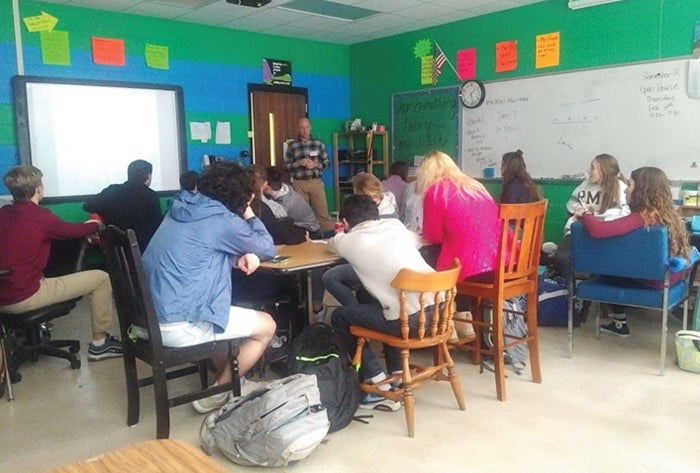Catawba College collaborates with Rowan-Salisbury Schools
Published 12:00 am Thursday, February 15, 2018

- Stein speaks to students at Salisbury High School. Submitted photo
Catawba College
SALISBURY — Advanced-placement environmental science students at Salisbury High School had an opportunity to hear from two National Geographic Explorers who visited Catawba College last week.
On Feb. 6, students participated in a presentation by Andrew Stein, a National Geographic Explorer and founder and director of CLAWS (Communities Living Among Wildlife Sustainably). Stein is a colleague of Luke Dollar, chairman of Catawba’s Environment and Sustainability Department. He was in town for a presentation titled “Can a Story Save the African Lion?” at the Center for the Environment.
Stein, an assistant professor of natural science at Landmark College and an adjunct faculty member at the University of Massachusetts Amherst, has over a decade of experience studying human-carnivore conflict — from African wild dogs and lions in Kenya and Botswana to leopards and hyenas in Namibia.
Recently, he has expanded his interests to explore nonlethal approaches to mitigate livestock conflict with lions in northern Botswana and wolves on Montana ranchland.
Stein’s presentation to students in Carie Fugle’s class is just one of the many collaborations between Catawba College and Rowan-Salisbury Schools. In late January, the two announced a partnership that will allow lateral-entry teachers to earn a teacher’s certification through Catawba at a discount thanks to scholarship funds provided by longtime benefactors of both Catawba and Rowan-Salisbury Schools.
On Feb. 8, Dollar hosted another visitor to the Catawba campus, T.H. Culhane — also a National Geographic Explorer, as well as founder of the NGO Solar Cities and a professor at University of South Florida’s Patel College of Global Sustainability.
Culhane, who was at Catawba to speak about alternative energy, living off-grid, education and employment opportunities in the environment and sustainability fields, shared a similar message to environmental science students at Salisbury High School.
Culhane also continued work with Catawba students on their ongoing biogas digester project, adding closed-loop heating coils, fueled by self-generated biogas, to aid increased biogas production in the colder months. In the spring, the Department of Environment and Sustainability plans to hold a cookout exclusively using biogas from the digester in the Catawba greenhouse, demonstrating how this off-grid equipment can provide an endless supply of sustainable, off-grid biofuels for cooking and power generation.
The department is further extending its links with both Explorers’ academic departments and institutions.
Stein’s Landmark College is a two-year undergraduate institution, granting associate degrees. An arrangement to channel students to Catawba’s Department of Environment and Sustainability for their bachelor’s degrees after completion of their studies at Landmark is in the works.
Culhane’s professorship, in the Patel College of Global Sustainability at USF, is a graduate-only program. Dollar and Culhane are arranging for a 3-2 program between Catawba and USF, in which Catawba undergraduates could complete their fourth year of undergraduate work at the same time as their first year of graduate studies, therefore completing both a bachelor’s degree from Catawba and a master’s degree from USF in just five years.
Rowan County high school students ages 14-17 are invited to apply to participate in a national environmental summit, Redesigning Our Future, scheduled July 14-17 at Catawba College.
Activities, which will be centered in the classrooms and labs of the Center for the Environment and in the adjacent Stanback Ecological Preserve, provide an opportunity for young environmental leaders to learn, create, share and build relationships.
The summit is sponsored by the Center for the Environment, Rocky Mountain Institute, Environmental Working Group, and Yellowstone Forever. Its goal is to allow participants to create leadership skills.
A $90 summit tuition discount is offered for students who submit their application materials by May 1. For more information, visit www.centerfortheenvironment.org.
Catawba College also offers scholarships to college-bound high school students and students transferring from other institutions, like Rowan-Cabarrus Community College, who are interested in pursuing an academic major in environment and sustainability.
New students indicating an interest in those majors are eligible for scholarships of $5,000 a year for each year they attend the college, in addition to other competitive environment-specific merit scholarships and need-based aid they may qualify for. Students are invited to apply for both admission and these scholarships at www.catawba.edu/apply.


